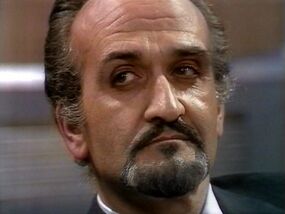Roger Delgado
Roger Delgado (born Roger Caesar Marius Bernard de Delgado Torres Castillo de Roberto) portrayed the first onscreen incarnation of the Master in Doctor Who.
He was born in Whitechapel, London; his father was Spanish and his mother French. Delgado often remarked to Jon Pertwee, a close friend, that because he had been born within the sound of Bow Bells, that this made him a true Cockney.
Delgado worked extensively on the British stage, and on TV, film and radio. He appeared as journalist Hugh Conrad in the 1955 BBC television serial Quatermass II, had a role in the Powell and Pressburger war classic Battle of the River Plate, and came to wide popular attention in Britain when he played the duplicitous Spanish envoy Mendoza in the 1961 ITV series Sir Francis Drake, after which he was much in demand. His saturnine looks meant that he was frequently cast as a villain and he appeared in many noted British action-adventure TV series of the 1960s, including The Avengers (1961, 1969), Danger Man (1961), The Saint (1962, 1966), The Power Game (1966), Man in a Suitcase (1968), Mogul (1968), The Champions (1969), Randall and Hopkirk (Deceased) (1969), The Persuaders! (1972) and Jason King (1972) — as well as detective shows such as Maigret (1962-63), Detective (1964), Sergeant Cork (1964), Sherlock Holmes (1965), The Rivals of Sherlock Holmes (1971); and The Zoo Gang (1973), which would sadly be his last ever on-screen British appearance. Another notable appearance was opposite Rex Harrison in an adaptation of The Adventures of Don Quixote for BBC Play of the Month (1973).
His film roles included one of the members of the title organisation in The Assassination Bureau (1968), starring Diana Rigg and Oliver Reed and the Mexican Consul in the 1959 sci-fi Film First Man into Space. He also appeared in several films for Hammer: as Bundar, one of the titular stranglers in The Stranglers of Bombay (1959); Tang Hao, a Tong enforcer in The Terror of the Tongs (1961); and Hasmid in The Mummy's Shroud (1967). One of his performances on radio was the lead role on The Slide, written by Victor Pemberton. This story was later used as the basis for the Doctor Who adventure Fury from the Deep, also written by Pemberton.

He made his first appearance in Doctor Who in the 1971 adventure Terror of the Autons. He subsequently reprised the role of the Master in many of the Third Doctor's serials. At Delgado's request — he had been having trouble finding other work as other directors thought he was working full-time as the Master — the story arc featuring the Master was to have ended in The Final Game, with the character reportedly to have been killed off. Sadly, Delgado's sudden death forced the story to be scrapped, while the role has since been played by several other actors.
Delgado died on location in Turkey whilst shooting his first comedy role in the French mini-series Bell of Tibet. He was killed, along with two film technicians, when the chauffeur-driven car in which he was travelling came off the road and plunged into a ravine. As such, he has the sad distinction of being the first major Doctor Who actor to die.
Pertwee often remarked that Delgado's death at the age of fifty-five was one of the catalysts that led to his own departure from Doctor Who the following year. Despite his villainous typecasting, friends and colleagues have constantly stated over the years that in real life Delgado was a kind and gentle man.
There is a featurette, Roger Delgado: The Master, on the DVD of Frontier in Space (which proved to be his final appearance in the role), which serves as a dedicated biography of his life.
Appearances
- TV: Terror of the Autons
- TV: The Mind of Evil
- TV: The Claws of Axos
- TV: Colony in Space
- TV: The Dæmons
- TV: The Sea Devils
- TV: The Time Monster
- TV: Frontier in Space
Delgado's likeness appeared on the covers for the novels The Dark Path and The Face of the Enemy, both of which feature his version of the Master.
His widow Kismet Delgado voiced one of the Eight Legs in Planet of the Spiders.
An archived voice-clip from The Dæmons was used in the TV story Utopia to represent this incarnation speaking from within the mind of the War Master turned human.
